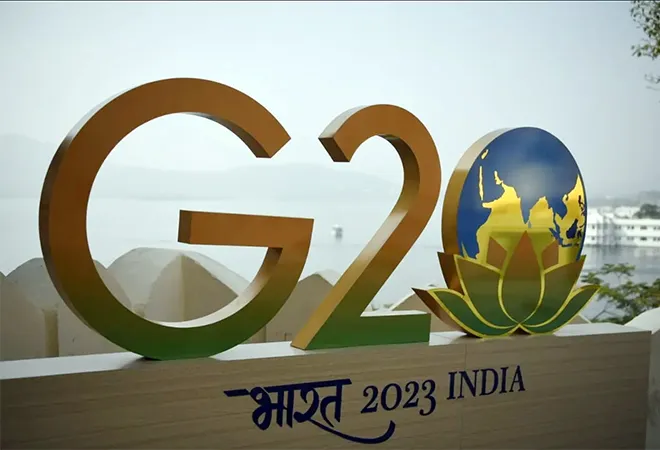-
CENTRES
Progammes & Centres
Location
India now has the unique opportunity to outline and action specific U20 goals to link with the larger objectives of G20.

Fifty percent of the world’s population currently lives in urban areas, which is projected to increase by 1.5 times to 6 billion. However, cities continue to face mounting challenges in accommodating the needs of this rapidly expanding population. Moreover, the Global South faces the twin challenges of managing the urban sprawl while delivering a good quality of life for its citizens.
As a catalyst for global change, what promises can India’s presidency hold for half the world’s urban population? How can India set an example for city planners of the developing world to ensure the availability of and accessibility to basic amenities and infrastructure? How can India’s G20 presidency contribute to the pressing urban issues?
G20’s Sustainable Development agenda aligns itself with sustainable actions to meet the goals of the 2030 Agenda. Within the G20 ecosystem, a city diplomacy initiative called the “Urban 20” (U20) was launched in December 2017. As one of the formal Engagement Groups under G20, the U20 forum was meant to collectively raise critical urban issues of G20 cities during the G20 negotiations.
U20 specifically focuses on climate change, sustainable development, and socio-economic issues in connection with the Sustainable Development Goals.
U20’s City Sherpas emphasise on the increasing importance of cities (both G20 and non-G20) as a country’s engines of innovation, economic growth, and productivity. U20 specifically focuses on climate change, sustainable development, and socio-economic issues in connection with the Sustainable Development Goals. As an assemblage of C40 Cities (C40) and the United Cities and Local Governments (UCLG), U20 functions under the leadership of an annual chair city that is based in the G20 host country. U20’s last Summit, held in Jakarta in 2022, focused on post-COVID economic and social recovery. A total of 96 cities joined in person, while 31 city mayors attended the event virtually to sign the Communiqué.
Despite U20’s concerted efforts to run parallel to G20, the absence of any written constitution, procedures, or formal agreement has made U20 unable to effectively address the aspirations and concerns of cities. U20 seems to have largely remained a platform for expression and making recommendations without being able to directly influence urban planning or implement policy initiatives.
Within this framework, India now has the unique opportunity to outline and action specific U20 goals to link with the larger objectives of one of the most influential international forums. By exploring the interlinkages and shared issues related to urban planning, India can help pave the way to bring about a global consensus for renewed urban vigour.
India’s U20 prospect can work towards engaging in meaningful policymaking and investments towards fulfilling the global 2030 Agenda. By mindfully planning the allocation of urban resources and inspiring sustainable practices, India can set a new balanced template. While learning from the best practices of some of the soundest cities, India has the chance to initiate action towards contemporary and pressing urban issues globally.
India now has the unique opportunity to outline and action specific U20 goals to link with the larger objectives of one of the most influential international forums.
In a post-pandemic world, U20 2023 can prioritise the role of urban mental health to raise awareness of its bearing as a consequence of an overpowering built environment. A multi-sector approach can facilitate bringing together global experts from different fields to deliberate on the overlooked aspects of urban distresses. Urban amenities must account for the improvement of the overall quality of life and social-emotional well-being.
India’s theme of G20 2023 holds the promise of interconnectedness to bring in an attitudinal change through deliberation, partnerships, dialogues, cooperation and knowledge-sharing. India can lead the way for global response and action by setting the stage for newer partnerships and agreements to facilitate community empowerment and social justice at both the local and societal levels. By stressing on equity, inclusivity, sustainability and resilience, U20 2023 will be able to honour its commitment to establish better cities.
The views expressed above belong to the author(s). ORF research and analyses now available on Telegram! Click here to access our curated content — blogs, longforms and interviews.

Dr. Anusha Kesarkar Gavankar is a Senior Fellow at ORF’s Centre for Economy and Growth. Her research spans urban transformation, spatial planning, habitats, and the ...
Read More +